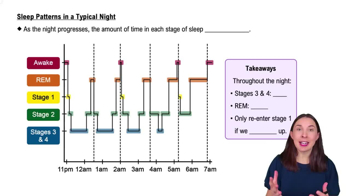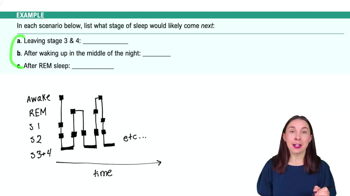Table of contents
- 1. Introduction to Psychology1h 43m
- 2. Psychology Research2h 20m
- 3. Biological Psychology2h 41m
- 4. Sensation and Perception28m
- 5. Consciousness and Sleep32m
- 6. Learning41m
- 7. Memory34m
- 8. Cognition37m
- 9. Emotion and Motivation35m
- 10. Developmental Psychology33m
- 11. Personality48m
- 12. Social Psychology41m
- 13. Stress and Health41m
- 14. Psychological Disorders44m
- 15. Treatment47m
5. Consciousness and Sleep
Sleep
Struggling with Psychology?
Join thousands of students who trust us to help them ace their exams!Watch the first videoMultiple Choice
Even if Lily eats a late breakfast, she still feels hungry at noon. This is an example of
A
classical conditioning.
B
instinct.
C
drive reduction.
D
obesity.
 Verified step by step guidance
Verified step by step guidance1
Identify the key elements in the scenario: Lily feels hungry at noon despite having a late breakfast.
Consider the concept of classical conditioning, which involves learning through association. In this context, Lily's hunger at noon could be a conditioned response to the time of day, regardless of her breakfast timing.
Evaluate the concept of instinct, which refers to innate behaviors that are not learned. Determine if Lily's hunger is an instinctual response or if it is learned.
Examine drive reduction theory, which suggests that physiological needs create an aroused state that drives an organism to reduce the need. Consider if Lily's hunger is a drive that needs to be reduced.
Consider the concept of obesity, which is a medical condition involving excess body fat. Determine if this is relevant to Lily's situation or if it is unrelated to the timing of her hunger.

 3:25m
3:25mWatch next
Master Circadian Rhythms with a bite sized video explanation from Hannah Gordils
Start learningRelated Videos
Related Practice


































































































![Race, Genes and IQ Differences | Bret Weinstein [Mini Clip]](https://img.youtube.com/vi/IztL_m3pd70/mqdefault.jpg)



































































































